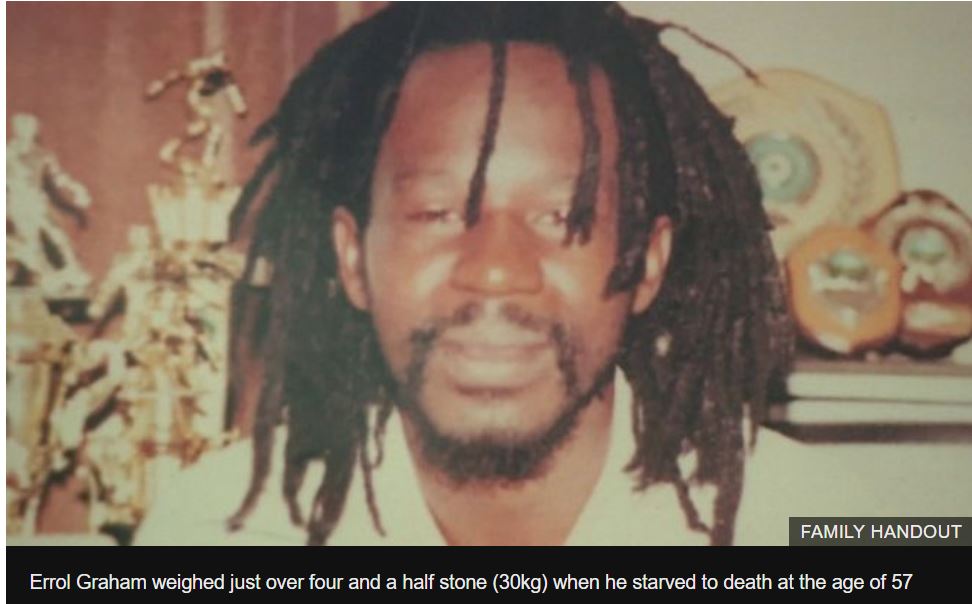
On 12 & 13 January, a judicial review regarding Errol Graham, who tragically starved to death after his disability benefits were cut off, will be heard at the High Court online. His son’s fiancée, Alison Turner, is courageously bringing the case, with Leigh Day solicitors. The hearing will consider why Mr Graham’s Employment and Support Allowance (ESA) was stopped by the Department of Work and Pensions (DWP) when they knew he had severe mental distress.
This legal case against the DWP is even more urgent during the lockdowns while it’s harder to access support and many more people are isolated. When Mr Graham was found dead at home in Nottingham by bailiffs in 2018, there was no food in his flat. He had been cut off ESA for “failure to attend” a work capability reassessment interview, and failure to show “good cause” for missing it. Alison and her legal team are focussing on why the DWP did not continue their inquiries and further contact his GP, his welfare rights representative, family members or others when he didn’t reply; and their duty under the Equality Act to promote equality and eliminate discrimination. Our side says that DWP “safeguarding visits” are futile when claimants with mental distress can’t cope and are unlikely to respond.
Those of us who are people of colour suffer systemic racism — combined with disability discrimination in the brutal benefits system. WinVisible knows from helping women with mental distress that the assessors Maximus and the DWP are still treating claimants as badly as ever. And women are struggling on low basic Universal Credit long-term, as interviews held by telephone under COVID are deemed “inconclusive” so they are denied the disability amounts added on.
We remember Jodey Whiting who took her own life in February 2017 after being cut off ESA for missing a face-to-face interview notification while she was in hospital. She had asked for a home visit on her renewal form. A DWP decision-maker disbelieved her account of being in hospital, saying there was “no proof”. Her benefits were stopped despite a known history of being suicidal. Her mum Joy Dove recently won the right to a second inquest, as the first one left out the DWP role.
If you want to attend the online hearing, please email the court at listoffice@administrativecourtoffice.justice.gov.uk stating that you wish to obtain access to the following hearing listed on 12-13 January:
CO/1689/2020 The Queen on the application of ALISON TURNER versus SECRETARY OF STATE FOR WORK AND PENSIONS
——————————
Press release by Leigh Day solicitors who are bringing the case:
Court case regarding Errol Graham to be heard
On 12 and 13 January 2021 a judicial review hearing will be heard at the High Court to consider the case of Errol Graham who starved to death in June 2018 after his Employment Support Allowance (ESA) payments were terminated by the Department of Work and Pensions (DWP) eight months earlier.

8 January 2021
The claim, brought on behalf of the family by Alison Turner (the fiancée of Mr Graham’s son), alleges that the decision to halt Mr Graham’s benefits in 2017 was unlawful and that the DWP’s ESA safeguarding policy on the termination of benefits is still unlawful, despite revisions that were belatedly made following the issuing of these proceedings.
Mr Graham, who suffered severe mental ill-health, was found starved to death aged 57, eight months after his ESA payments and housing benefit payments were halted. He had missed a fitness for work assessment and had not responded when the DWP tried to contact him by phone and in person. The payments were terminated in line with DWP policy, without any effort to contact next of kin or other support services and without considering whether Mr Graham’s known mental health issues could have been the reason for his lack of communication.
When Mr Graham was found dead, he weighed just four and a half stone, there was no food in his flat and no credit on his gas or electricity meters. An unsent letter to the DWP was found which pleaded “please judge me fairly”.
Following the issue of court proceedings by Ms Turner the DWP has made several changes to the safeguarding policy that was applied in Errol’s case and it has published new internal guidance.
Whilst welcoming the improvements made, Ms Turner says the ESA safeguarding policy remains unlawful in key respects:
- It puts the onus on vulnerable benefits claimants to prove to the DWP that they had “good cause” for failing to attend a meeting or not responding to communication. This is contrary to Regulation 24 of the Employment and Support Allowance Regulations 2008 and s149 of the Equality Act 2010.
- It fails to make clear that the DWP has a duty (not a discretion) to make inquiries, including where necessary from external individuals and bodies, to obtain sufficient information about the state of the Claimant’s health so they can properly assess whether they had good cause for missing an appointment or not responding to communication. That is a rigorous duty in part because many such claimants (in the same way Mr Graham was) will be at serious risk of harm or death if their benefits are terminated.
At the inquest into Mr Graham’s death, the coroner said more detail about his condition could have been sought from his GP and noted that there is no guidance for DWP staff following “failed safeguarding visits” as had occurred in his case, and no requirement in those cases to seek more information before a decision to cease benefits is made.
The coroner called for “robust policy and guidance…that ensures all evidence that can reasonably be gathered is put together about a client, before a benefit is ceased”.
Ms Turner is asking the court to give a declaration that the DWP’s decision to disallow Mr Graham’s benefits in October 2017 was unlawful because it was in breach of s.149 Equality Act 2010 and Regulation 24 of Employment Support Allowance Regulations 2008. She says there were strong indicators that his mental health or disability may have given him good cause for not responding and he was known to have long term depression, and the DWP’s policy should ensure such indicators are identified and considered.
Mind, the leading national mental health charity in England And Wales has submitted evidence in support of Ms Turner’s case and the Equality and Human Rights Commission are formally intervening in support.
Alison Turner is represented by Tessa Gregory and Carolin Ott of Leigh Day solicitors and Adam Straw and Jesse Nicholls of Doughty Street Chambers.
Alison Turner said:
“The DWP decision to stop paying Errol’s benefits meant that, without money to buy food and to pay for heating and lighting, in the end, he starved to death. Although at first the DWP maintained that their safeguarding policy was lawful, faced with a court case, they have made some changes to the policy.
“But these changes are not enough. It still falls to the vulnerable claimant to make sure the DWP knows why they have good cause not to respond to DWP enquiries. That makes no sense when vulnerable claimants might be too mentally ill to respond. For Errol’s sake, I have to challenge this policy so that other people don’t suffer in the way that he and our family did.”
Leigh Day partner Tessa Gregory, who represents Alison in her claim, said:
“Errol’s family have always made clear that their one goal in bringing this litigation is to try to ensure that no other families live through the same horrors they have. The DWP provide support to many others like Errol, who due to their significant mental health issues may miss appointments and may have difficulty responding to correspondence.
“It cannot be right that it falls to such vulnerable individuals to prove that they had a good cause for not responding and the DWP must require their staff where necessary to make further enquiries before taking the momentous decision of cutting off what is often a person’s only source of income. Unless and until the DWP changes its policies other vulnerable individuals will remain at risk of serious harm or death.”
Paul Farmer, Chief Executive of Mind, said:
“Mind has heard from many other people who have lost loved ones in similar horrendous circumstances. Mind provided expert testimony to the hearing based on the views of people with mental health problems who we’re in touch with who have had to endure awful experiences at the hands of a benefits system, which is made needlessly complicated and stressful.
“Change can’t come soon enough. The pandemic has caused devastating financial insecurity, with more people than ever relying on the benefits system to keep them afloat through this difficult period. We want to see a fair and compassionate benefits system.”
Information was correct at time of publishing. See terms and conditions for further details. (Leigh Day)

1 thought on “Errol Graham: legal case 12 & 13 January”